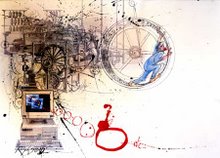1920's Social Commentary Rings True Today
Greetings to all of our loyal readers, we appreciate your support and the traffic we have received in three short weeks of publication has been overwhelming. As Editor-in-Chief I oversee the daily operations of the Water Buffalo Press and have the duty of compiling various highlight pieces as well as our daily quote which is culled from an individual born on the respective day. Yesterday we highlighted Bob Marley, a social commentator and reformer whose work still speaks to masses in today's society.
Today we highlight another commentator who came before Marley and is likely less well-known: Sinclair Lewis. One of the most revered and controversial authors during the 1900's, Lewis' most famous work is Babbitt, the story of a real estate salesman who begins to question the trappings of modern American life. When the work was released it was hailed as genius by some and skewered by others as an unfair potrait of the working man. Lewis was the first American to win a Nobel Prize for literature, however, most of his works were at one time or another banned in the U.S. In his acceptance of the Nobel Prize Lewis stated that "in America most of us — not readers alone but even writers — are still afraid of any literature which is not a glorification of everything American, a glory hole of our faults as well as our virtues," and that America is "the most contradictory, the most depressing, the most stirring, of any land in the world today."
His novels examine politics, religion, conservatism versus liberalism (in the true, original sense of the terms), marriage, children - and each page could easily be transferred from the 20's to the 2000's. In his work It Can't Happen Here Lewis wrote "When fascism comes to America, it will be wrapped in the flag and carrying a cross."
Again, thank you all for reading. There is much more in store for the WBP in the months to come. I will leave you with a passage from Babbitt, we are not ones to call for outright violent revolution but . . .
"THE strike which turned Zenith into two belligerent camps; white and red, began late in September with a walk-out of telephone girls and linemen, in protest against a reduction of wages. The newly formed union of dairy-products workers went out, partly in sympathy and partly in demand for a forty-four hour week. They were followed by the truck-drivers' union. Industry was tied up, and the whole city was nervous with talk of a trolley strike, a printers' strike, a general strike. Furious citizens, trying to get telephone calls through strike-breaking girls, danced helplessly. Every truck that made its way from the factories to the freight-stations was guarded by a policeman,trying to look stoical beside the scab driver. A line of fifty trucks from the Zenith Steel and Machinery Company was attacked by strikers-rushing out from the sidewalk, pulling drivers from the seats,smashing carburetors and commutators, while telephone girls cheered from the walk, and small boys heaved bricks."
Today is also James Spader's birthday. We would like to take this opportunity to begin a public outcry for the return of Rhona Mitra to the Boston Legal cast.
-Col. Rusty Shackleford, II
Publisher, Editor-in-Chief
Subscribe to:
Post Comments (Atom)










No comments:
Post a Comment